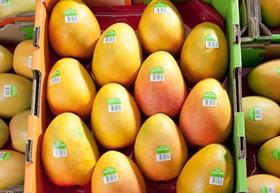
Australian Honey Gold mangoes have been largely unaffected by flowering issues which have hampered a number of the country’s other major varieties, according to Gavin Scurr, managing director of Piñata Farms.
Lead-in conditions to this year's Australian season varied markedly to previous years, with a colder winter and spring than usual across most growing areas causing reduced flowering. While a small portion of the Honey Gold crop has been impacted, Scurr said early indications still pointed to a crop volume consistent with last season's record output.
“Kensington Pride can be an inconsistent variety and this season is expected to produce about a third less than usual due to reduced flowering,' Scurr explained. 'A small percentage of the Honey Gold crop - from Bundaberg, Queensland to Coffs Harbour, New South Wales will produce about half of its usual volume, also due to poor flowering. However, the bulk of the crop in other regions is steady and expected to make up for any shortfall in that region.”
Piñata Farms holds the exclusive rights to the Honey Gold variety in Australia and, together with some 40 third-party growers, produces the variety across five states between November and March.
Harvest has already got underway at Katherine in the Northern Territory, with the first fruit of the season already arriving on supermarket shelves. Following a successful trial last season, Piñata is again picking its Katherine crop at night in an attempt to keep fruit fresh and blemish-free.
A small volume of Australian-grown Honey Gold mangoes will be exported to the US for the first time this season, following the establishment of a new protocol between the two nations. Fruit will be shipped to Los Angeles for national distribution. Other export markets for the variety include New Zealand and Singapore.



